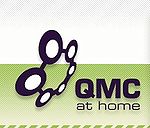- QMC@home
-
QMC@home Bereich: Chemie Ziel: Weiterentwicklung der Quanten-Monte-Carlo-Methode Betreiber: Westfälische Wilhelms-Universität Münster Land: Deutschland Plattform: BOINC Website: http://qah.uni-muenster.de Projektstatus Status: aktiv Beginn: Dezember 2005 Ende: noch aktiv QMC@home (Quantum Monte Carlo at home; dt.: Quanten-Monte-Carlo zu Hause) ist ein Projekt des verteilten Rechnens der Westfälischen Wilhelms-Universität in Münster.
Ziel des Projektes ist, die Quanten-Monte-Carlo-Methode zu testen und für die Anwendung in der Quantenchemie weiterzuentwickeln, um so die Struktur und Reaktivität von Molekülen besser vorhersagen zu können. Quantum-Monte-Carlo ist eine Methode, in der Simulation quantenmechanischer Systeme die Schrödinger-Gleichung mittels Monte-Carlo-Simulationen zu lösen.
Aktuell bereitet sich das Projekt auf das Ende der Beta-Phase vor und untersucht Alkan-Folding als ein grundlegendes Quanten-Modell für Faltungsprozesse von Molekülen. Ende Januar 2007 wurde die vorhergehende Berechnung von DNA-Basenpaaren abgeschlossen. QMC@home verwendet die BOINC-Infrastruktur.
Siehe auch
Weblinks
BOINC-ProjekteAktuelle Projekte: ABC@Home | Astropulse | CAS@home | ClimatePrediction.net | DistrRTgen | Einstein@home | Enigma@Home | FreeHAL | Ibercivis | Lattice Project | Leiden Classical | LHC@Home | Malaria Control Project | μFluids@Home | MilkyWay@home | NFS@Home | Orbit@home | PrimeGrid | Quake-Catcher Network | Rosetta@home | Seasonal Attribution Project | SETI@home | SIMAP | SZTAKI Desktop Grid | World Community Grid
Beta-Projekte BURP | CPDN Beta | Collatz Conjecture | Constellation (Plattform) | Cosmology@Home | Docking@Home | EDGeS@Home | GPUGRID.net | Ibercivis | Lattice Project | MindModeling@Home | OPTIMA@HOME | POEM@home | QMC@home | Renderfarm.fi | RNA World | SETI@home beta | Spinhenge@Home | Superlink@Technion | Test4Theory | WEP-M+2 Project | yoyo@home
Alpha-Projekte AlmereGrid Boinc Grid | Biochemical Library | CAS@home | Chess960@home | DistributedDataMining | DNA@Home | DNETC@HOME | DrugDiscovery@Home | eOn | FreeHAL | Goldbach's Conjecture Project | Hydrogen@Home | Magnetism@home | Mersenne@home | Moo! Wrapper | NFS@Home | NumberFields@home | Pirates@home | Primaboinca | QuantumFIRE | RADIOACTIVE@HOME | RALPH@home | RSA Lattice Siever | SAT@home | SLinCA@Home | Sudoku@vtaiwan | Surveill@Home | Virtual Prairie | Volpex | VTU@Home | WUProp@Home | YAFU
Beendete/nicht-aktive Projekte: 3x+1@Home | APS@Home | AQUA@home | Artificial Intelligence System | BBC Climate Change Experiment | BRaTS@Home | Cell Computing | Cels@Home | DepSpid | DynaPing | Eternity2.net | Genetic Life | HashClash | Nano-Hive@Home | NQueens@home | Predictor@home | Proteins@home | Ramsey@Home | Rectilinear Crossing Number | Reversi | Riesel Sieve | RND@home | SciLINC | SHA-1 Collision Search Graz | Sudoku project | Tanpaku | Virus Respiratorio Sincitial | XtremLab
Wikimedia Foundation.
Schlagen Sie auch in anderen Wörterbüchern nach:
QMC@Home — QMC@Home … Википедия
QMC@Home — Bereich: Chemie Ziel: Weiterentwicklung der Quanten Monte Carlo (QMC) Methode Betreiber: Westfälische Wilhelms Universität Münster Land: Deutschland Plattform … Deutsch Wikipedia
QMC@Home — is a distributed computing project for the BOINC client aimed at further developing and testing Quantum Monte Carlo (QMC) for use in quantum chemistry. It is hosted by the University of Münster, Germany. QMC@Home allows volunteers from around the … Wikipedia
QMC — ist: ein Verfahren nach Quine und McCluskey, um Boolesche Ausdrücke, die in der disjunktiven Normalform (DNF) stehen, zu minimieren die Abkürzung für Quasi Monte Carlo, eine bestimmte Art der Zufallsverteilung die Abkürzung für das Queen s… … Deutsch Wikipedia
Orbit@home — is a BOINC based distributed computing project of the Planetary Science Institute. It uses the Orbit Reconstruction, Simulation and Analysis[1] framework to optimize the search strategies that are used to find near earth objects. On March 4, 2008 … Wikipedia
Rosetta@home — infobox software name = Rosetta@home caption = Rosetta@home screensaver for CASP 8 target [http://predictioncenter.gc.ucdavis.edu/casp8/target.cgi?id=119 view=all T0482] developer = Baker laboratory, University of Washington; Rosetta Commons… … Wikipedia
Chess960@home — is a distributed computing project that runs on the BOINC software platform. It aims to create a vast collection of Chess960 games and to publish it on the internet for public use. In Chess960@home one half move is one workunit. The deadline for… … Wikipedia
Cosmology@Home — logo Cosmology@Home is a BOINC distributed computing project, run at the Departments of Astronomy and Physics at the University of Illinois at Urbana Champaign. Contents 1 Goals … Wikipedia
MindModeling@Home — is a non profit research project that uses volunteer distributed computing for the advancement of cognitive science. The research focuses on utilizing computational cognitive process modeling to understand the human mind better. The project aims… … Wikipedia
Einstein@home — Bereich: Astronomie Ziel: Nachweis von Gravitationswellen, Suche nach binären Radiopulsaren Betreiber … Deutsch Wikipedia

